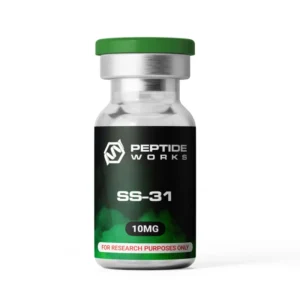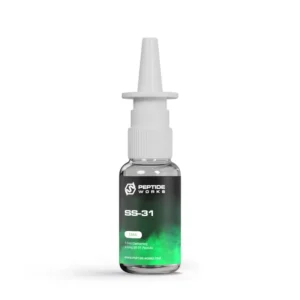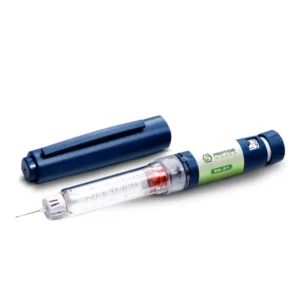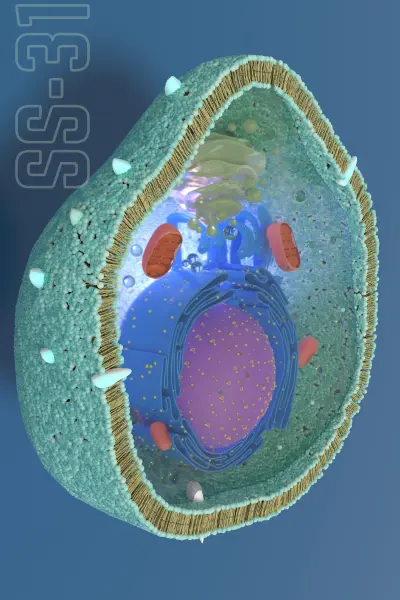PROMO!
First order? Get 10% OFF with this code: 1storder
Our Product Categories



SS-31 peptide, also known as elamipretide, is a small, mitochondria-targeting tetrapeptide designed to protect and restore mitochondrial function. It is composed of four amino acids: D-Arginine, 2′6′-dimethyltyrosine, lysine, and phenylalanine. SS-31 is unique because it selectively binds to cardiolipin, a phospholipid found only in the inner mitochondrial membrane.
By stabilizing cardiolipin, SS-31 helps keep mitochondria healthy, lowers oxidative stress, and boosts energy production. This peptide has been extensively studied for its potential therapeutic applications in conditions involving mitochondrial dysfunction, such as neurodegenerative diseases, cardiovascular disorders, and age-related muscle decline.
Peptide Sequence (IUPAC Condensed): H-D-Arg-Tyr(2,6-diMe)-Lys-Phe-NH2
Molecular Formula: C32H49N9O5
Molecular Weight: 639.8 g/mol
Synonyms: Elamipretide
View the SS-31 Certificate Of Analysis (COA)
View the SS-31 High Performance Liquid Chromatography (HPLC)

SS-31 works by attaching itself to cardiolipin, a crucial part of the inner mitochondrial membrane. This interaction helps to stabilize the membrane’s structure and protect it from oxidative damage. As a result, it enhances the organization of the respiratory chain supercomplexes, which boosts the overall efficiency of the mitochondria.
By preventing the leakage of electrons in the electron transport chain, SS-31 effectively lowers the production of reactive oxygen species (ROS) and lessens oxidative stress. This stabilization leads to an increase in ATP production, which is essential for energy-demanding tissues like the heart, brain, and muscles.
Moreover, SS-31 shows protective qualities by reducing cell death (apoptosis) and inflammation. SS-31 shows promise as a therapy for conditions like cardiovascular disease, neurodegenerative disorders, muscle dysfunction, and kidney disease. It works by targeting mitochondrial dysfunction, offering a new approach to treating diseases related to energy issues and oxidative stress.
Protection in kidney / renal injury: Research shows that the SS-31 peptide can protect the kidneys from damage by addressing mitochondrial dysfunction and oxidative stress. In studies on diabetic kidney disease, SS-31 reduced harmful reactive oxygen species (ROS), improved mitochondrial function (restoring energy production and membrane potential), and prevented cell death.
It also blocked key pathways that drive inflammation and scarring in the kidneys while reducing protein loss in urine and kidney fibrosis [1]. Studies in older mice have shown that SS-31 improves the structure of mitochondria in kidney cells, reduces kidney scarring, and lowers aging markers [2]. It also strengthened the health of key kidney cells, showing promise for treating kidney damage caused by aging or disease.
Cardiovascular / vascular & atherosclerosis: Research suggests that the SS-31 peptide demonstrates significant cardiovascular protective effects by targeting mitochondrial dysfunction, oxidative stress, and inflammation. In atherosclerosis models, SS-31 reduced plaque size, oxidative stress markers (DHE, 8-OHDG), and systemic inflammation (ICAM-1, MCP-1, IL-6). It also improved cholesterol transport by downregulating CD36 and LOX-1, preventing foam cell formation and lipid accumulation [3].
In pulmonary arterial hypertension (PAH) models, SS-31 attenuated right ventricular pressure, reduced oxidative stress (NOX-1/2), inflammation (TNF-α, MMP-9), and fibrosis (TGF-β), while enhancing antioxidant defenses (HO-1, GPx) [4].
Additionally, SS-31 reversed age-related oxidative damage in cardiac proteins, restoring mitochondrial and cardiac function, highlighting its potential in mitigating vascular and cardiac aging [5].
Neuroprotection / retina / brain: SS-31 peptide shows strong potential to protect nerve cells by addressing mitochondrial issues, oxidative stress, and inflammation. In glaucoma studies, it helped save retinal ganglion cells (RGCs), kept retinal layers healthy, and improved eye function. It also reduced oxidative stress, prevented cell death, and protected retinal cells [6].
In Alzheimer’s disease models, SS-31 lowered harmful β-amyloid buildup, reduced mitochondrial damage and oxidative stress, and restored important proteins for brain function, improving memory and cognition [7]. Additionally, SS-31 supports healthier mitochondria by boosting their growth, repair, and survival, making it a promising treatment for neurodegenerative diseases.
Mitochondria, Aging, and Muscle Endurance: Research suggests that the SS-31 peptide significantly improves mitochondrial function, muscle endurance, and redox balance in aging skeletal muscle. A study in aged mice demonstrated that a single SS-31 treatment rapidly restored mitochondrial ATP production, oxidative phosphorylation coupling (P/O), and energy state (PCr/ATP) to youthful levels within one hour. Prolonged treatment (8 weeks) further enhanced fatigue resistance, muscle mass, and treadmill endurance [8].
Studies show that SS-31 works by lowering harmful molecules called mitochondrial ROS, restoring the balance of antioxidants like glutathione, and fixing damaged proteins in muscles. Importantly, it does all this without needing to increase the number of mitochondria. This makes SS-31 a promising treatment for combating age-related muscle loss and enhancing overall quality of life [9].
Anti-fibrotic, anti-apoptotic, and anti-inflammatory properties: Research shows that SS-31 has strong anti-fibrotic, anti-apoptotic, and anti-inflammatory effects by targeting mitochondrial dysfunction. It lowers mitochondrial ROS production, prevents depolarization, and inhibits the mitochondrial permeability transition pore, protecting cells from oxidative damage.
In renal disease models, SS-31 reduces fibrosis by preserving mitochondrial integrity and limiting pro-fibrotic signaling. It prevents apoptosis by blocking cytochrome c release and balancing Bax/Bcl-2 proteins. Additionally, SS-31 reduces inflammation by modulating mitochondrial-driven pathways, lowering cytokine production, and preventing Ca2+-induced swelling. These properties make SS-31 a promising treatment for conditions involving mitochondrial dysfunction and chronic inflammation [10].
[1] Y Hou, S Li, M Wu, et al (2016) Mitochondria-targeted peptide SS-31 attenuates renal injury via an antioxidant effect in diabetic nephropathy – American Journal of Physiology: Renal Physiology, 2016 Mar 15, Volume 310 (Issue 6), Page F547-59.
[2] M T Sweetwyne, J W Pippin, D G Eng, et al (2017) The mitochondrial-targeted peptide, SS-31, improves glomerular architecture in mice of advanced age – Kidney International, 2017 May, Volume 91 (Issue 5), Pages 1126-1145.
[3] M Zhang, H Zhao, J Cai, et al (2017) Chronic administration of mitochondrion-targeted peptide SS-31 prevents atherosclerotic development in ApoE knockout mice fed Western diet – PLoS One, 2017 Sep 29, Volume 12 (Issue 9), Page e0185688.
[4] H-I Lu, T-H Huang, P-H Sung, et al (2016) Administration of antioxidant peptide SS-31 attenuates transverse aortic constriction-induced pulmonary arterial hypertension in mice – Acta Pharmacologica Sinica, 2016 May, Volume 37 (Issue 5), Pages 589-603.
[5] J A Whitson, M Martín-Pérez, T Zhang, et al (2021) Elamipretide (SS-31) treatment attenuates age-associated post-translational modifications of heart proteins – Geroscience, 2021 Oct, Volume 43 (Issue 5), Pages 2395-2412.
[6] X Wu, Y Pang, Z Zhang, et al (2019) Mitochondria-targeted antioxidant peptide SS-31 mediates neuroprotection in a rat experimental glaucoma model – Acta Biochimica et Biophysica Sinica, Volume 51, Issue 4, April 2019, Pages 411–421.
[7] N T Nhu, S-Y Xiao, Y Liu, et al (2022) Neuroprotective Effects of a Small Mitochondrially-Targeted Tetrapeptide Elamipretide in Neurodegeneration – Frontiers in Integrative Neuroscience, 2022 Jan 17, Volume 15, Page 747901.
[8] M D. Campbell, J Duan, A T. Samuelson, et al (2019) Improving mitochondrial function with SS-31 reverses age-related redox stress and improves exercise tolerance in aged mice – Free Radical Biology and Medicine, Volume 134, April 2019, Pages 268-281.
[9] M P Siegel, S E Kruse, J M Percival, et al (2013) Mitochondrial-targeted peptide rapidly improves mitochondrial energetics and skeletal muscle performance in aged mice – Aging Cell, 2013 Oct, Volume 12 (Issue 5), Pages 763-71.
[10] Y Zhu, M Luo, X Bai, et al (2022) SS-31, a Mitochondria-Targeting Peptide, Ameliorates Kidney Disease – Oxidative Medicine and Cellular Longevity, 2022 Jun 6, Volume 2022, Page 1295509.
The answers to the most frequently asked questions about SS-31.

SS-31 is a peptide that specifically targets mitochondria, where it binds to cardiolipin an essential lipid found in the inner membrane. This interaction helps preserve the membrane’s structure and minimize electron leakage, effectively lowering oxidative stress. By stabilizing cardiolipin, SS-31 promotes efficient energy production and supports healthier mitochondrial function during stress.
You can buy SS-31 from Peptide Works, your trusted source for high-quality research peptides. Our SS-31 is synthesized for purity and consistency, ideal for scientific and laboratory studies. All products are intended strictly for research use only not for human consumption or therapeutic use.
In the United States, SS-31 is not approved by the FDA for human use outside of controlled clinical research and is unavailable to US customers. It is available only for laboratory and scientific studies. SS-31 is supplied strictly for research purposes, not for human or veterinary use. Regulations may vary by country or region, so always check local laws before purchase.
In laboratory studies, SS-31 has shown strong effects on mitochondrial function and oxidative balance. Some experiments note changes in cellular energy activity or redox signaling, depending on the research model and concentration used. Data suggest SS-31 is generally well tolerated in controlled settings, though its complete safety profile continues to be evaluated in ongoing studies.

The blog examines the potential of the SS-31 peptide in protecting cells from stress and damage through its targeted action on mitochondria. It emphasizes its ability to reduce oxidative stress, improve energy balance and slow age-related decline. The article also discusses its influence on neurodegeneration, cardiovascular function, and healthy aging, while offering insights into related peptides such as Humanin.

This blog explores the potential of the MOTS-C peptide in promoting fat loss and improving overall metabolic health. It also discusses how MOTS-C affects energy regulation, fat oxidation and insulin sensitivity through mitochondrial pathways. Comparisons with other peptides such as AOD-9604 and Tesamorelin, highlight its distinct role in advancing fat metabolism research.

This blog explains how AMPK helps the heart manage energy and stay strong. It shows what happens when heart cells run low on fuel, how oxidative stress harms them, and why protein repair is important. It also covers how AMPK boosts fat burning, supports cellular balance, and why researchers study AMPK and other peptides to understand heart health in the lab better.
ALL CONTENT AND PRODUCT INFORMATION AVAILABLE ON THIS WEBSITE IS FOR EDUCATIONAL PURPOSES ONLY.
DISCLAIMER: These products are intended solely as a research chemical only. This classification allows for their use only for research development and laboratory studies. The information available on our Peptide Works website: https://peptide-works.com/ is provided for educational purposes only. These products are not for human or animal use or consumption in any manner. Handling of these products should be limited to suitably qualified professionals. They are not to be classified as a drug, food, cosmetic, or medicinal product and must not be mislabelled or used as such.